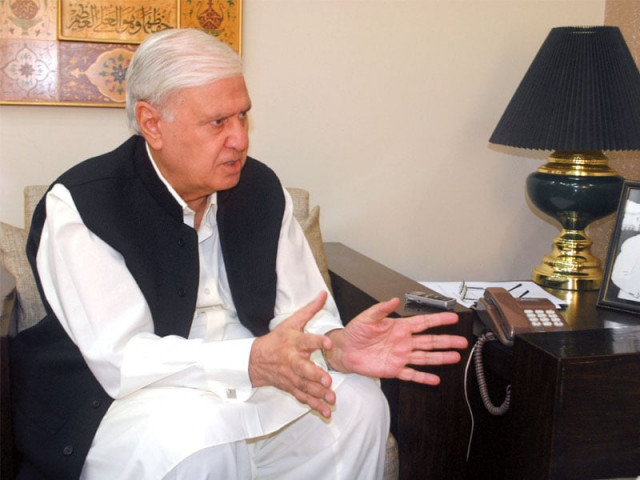Aftab Sherpao calls for negotiations with militants
Criticises ANP for failing to get K-P’s due from federal govt.

In recent times, Jamiat Ulema Islam-Fazl has held jirgas in the tribal areas and called for talks with militants, while the Pakistan Tehreek-e-Insaf has also reiterated its support of having negotiations with the Taliban.
Although Sherpao recently changed the name of his party Pakistan Peoples Party-Sherpao to Qaumi Watan Party (QWP) to focus more on local politics, he retains a strong stand on militancy.“The government has to create a situation where the Taliban can sit with them and have a dialogue,” he said. The government is following an incident-based policy, which is not working out, Sherpao added.
“The government needs to initiate a dialogue with the help of the political administration, who can persuade tribal elders to have talks with the Taliban,” Sherpao said. “We need to have a consistent policy and it should be periodically reviewed to analyse its effectiveness, but unfortunately we do not see that happening.”
“Neither the president nor the prime minister or any other high-ranking government official has visited the tribal belt in the past four years,” he said, adding that at least a tribal jirga could have been called.
While referring to the army as the sole drivers of policy in Khyber-Pakhtunkhwa, he said: “Unless the army withdraws from the Malakand Division and the civilian government establishes its control, peace cannot be established in the region.”
Criticising the ANP
Sherpao said that the Awami National Party has failed to highlight the sufferings of the Pakhtuns and get K-P’s due from the federal government, which led him to change the name of his party on October 17.
He will be participating in the upcoming elections with a new flag and a more nationalistic manifesto.
The former PPP leader criticised the provincial government at length about the lack of development in the province. “Pakistan is losing $8 billion annually on the war on terror in which $2-3 billion is paid by the provincial government.”
He added that the province has yet to reconstruct schools that were destroyed due to militancy and build infrastructure that collapsed during the 2010 floods.
Af-Pak relations
The former interior minister said that uniting all Pakhtuns is his dream, adding that they should come together under one administrative unit through a democratic process.
“The sufferings of the Pakhtuns have increased in the past years, while the provincial government stays silent on the issue,” he said. He added that his party will also fight for the rights of the Pakhtuns across the Durand line.
The grand Pak-Afghan jirga in 2007, in which Taliban representatives were also present, was a unique demonstration of unity between Pakhuns living on both sides of the border, he said. “Because of the jirga, there was less criticism in Afghanistan about Pakistan, but unfortunately the governments could not keep the Afghans engaged in progressive dialogue.”
He added that one of the decisions of that jirga was to establish a secretariat on both sides to hold talks with the Taliban.
To end the distrust between the two countries, the government needs to work on a three tier strategy: government to government, establishment to establishment, and people to people, he added.
Replying to a question, regarding the withdrawal of foreign troops from Afghanistan in 2014, Sherpao said Pakistan needs to develop a strategy for the pullout. “We should be part of the solution and similarly Pakhtuns should be part of developing Pakistan’s policies on Afghanistan.”
Published in The Express Tribune, October 31st, 2012.













COMMENTS
Comments are moderated and generally will be posted if they are on-topic and not abusive.
For more information, please see our Comments FAQ